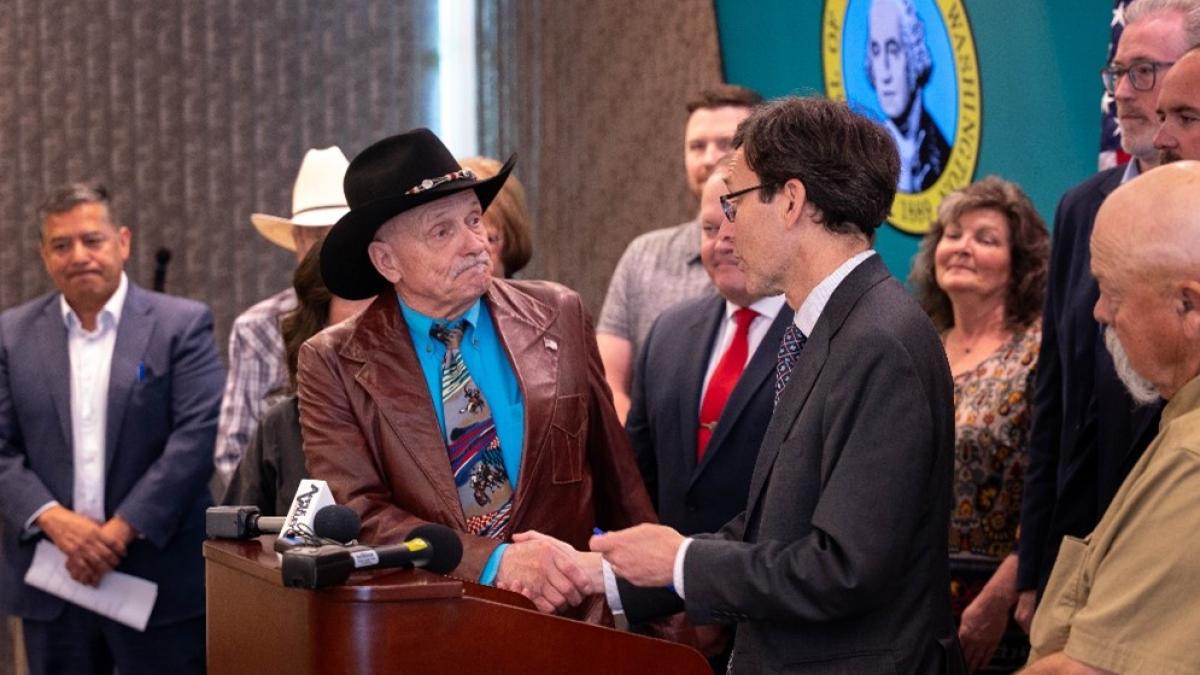Coalition asserts the illegal, arbitrary tariffs cause disproportionate, serious harm in Washington state
OLYMPIA — Governor Bob Ferguson filed an amicus (“friend of the court”) brief yesterday supporting a multistate lawsuit to block the Trump Administration’s illegal tariffs. Ferguson is leading a coalition of 24 public and private partners arguing that the “unlawful, arbitrary, and ever-changing tariff policy” is causing wide-ranging, significant and disproportionate harm in Washington state — one of the most trade-dependent states in the country.
Ferguson’s amicus brief states: “If allowed to remain in effect, the President’s tariffs will continue to wreak havoc on Washington-based interests by disrupting established supply chains, forcing businesses and consumers to pay more for goods, equipment, and services, and interfering with the Governor’s ability to shape and implement a state budget and pursue state policy priorities amid the significant uncertainty, chaos, and adverse economic conditions caused by the tariffs.”
Ferguson is joined by State Treasurer Mike Pellicciotti; 10 state legislators; the mayors of Seattle and Spokane; five labor unions; the Washington Economic Development Association, a trade association whose members include Washington-based economic development organizations, cities, counties, ports, tribes, businesses, education and community-based organizations; and other business and economic development interests.
The Attorney General’s Office appointed attorneys Steven Fogg and Kathryn Joy of Corr Cronin LLP as special assistant attorneys general to handle the brief pro bono, at no cost to the state.
The multistate lawsuit, filed April 23 in the U.S. Court of International Trade, challenges four of President Donald Trump’s executive orders that claim the power to increase tariffs worldwide without Congressional approval.
The Constitution grants Congress, not the President, the authority to impose tariffs.
“Our coalition is ensuring the voices of Washington’s workers and businesses are heard,” Governor Ferguson said. “Our economy faces significant harms because of the president’s chaotic and illegal approach to tariffs. We must all stand up for hardworking businesses, workers and consumers.”
“IAM District 751 supports this amicus brief and believes that tariffs should be used in a strategic and purposeful way to support and preserve our industries, our workers, and the communities we live in,” said Jon Holden, IAM District 751 President and Directing Business Representative. “These actions should be well thought out and guided by decisions that the U.S. Congress, after careful consideration, has determined to be most appropriate."
“When our organization, the Washington Economic Development Association — which represents about 200 economic development organizations across the state — was asked to join in stating our position against the federal tariffs implemented and proposed in recent months, we didn’t hesitate,” said Suzanne Dale Estey, Executive Director of the Washington Economic Development Association. “We had been hearing alarming concerns about the federal tariff proposals from economic developers who had been hearing from their local businesses, large and small. They were initially concerned about all of the uncertainty and turmoil that had been created and the impact on their operations, supply chains and growth strategies. More recently, we are now facing very real and very deep economic impacts, serious challenges for supply chains, job layoffs and potential revenue losses in the billions of dollars — and the overall drastic threats to Washington State’s economic competitiveness caused by federal tariffs. Our organization and our position on this issue is not partisan — it is about jobs — jobs which support families, and jobs which support communities.”
President Trump’s executive orders announced higher tariffs on virtually every nation in the world. These include a 145 percent tariff on most products from China — which has been temporarily reduced to 30 percent — as well as a 25 percent tariff on many products from Canada and Mexico, and 10 percent tariffs on most products from the rest of the world.
Article I of the Constitution vests Congress, not the President, with the “Power To lay and collect Taxes, Duties, Imposts and Excises.” Trump’s executive orders cite the powers granted by the International Emergency Economic Powers Act (IEEPA), but that law applies only when an emergency presents an “unusual and extraordinary threat” from abroad and does not empower the president to impose tariffs. Congress enacted IEEPA in 1977. No other president has imposed tariffs based on IEEPA.
The multistate lawsuit, which Ferguson’s brief filed today supports, asserts that the president does not have the authority to impose these steep tariffs without Congressional approval. It also challenges Trump’s plan to raise tariffs on imports from 46 other trading partners, scheduled to go into effect July 9.
Ferguson argues that the economy, businesses, and consumers in Washington, which is the country’s ninth-largest state exporter of goods, will “suffer unique and disproportionate harm from President Trump’s reckless and unprecedented tariffs.”
For example, China, Canda and Mexico are three of Washington’s top trading partners. Together, these three countries account for nearly half of Washington’s imports. In 2024, Washington companies exported $12 billion in goods to China, $7.9 billion in goods to Canada and $4.3 billion in goods to Mexico.
In all, Washington companies shipped $57.8 billion worth of goods to the world in 2024. Nearly $120 billion in exports and imports flowed through Washington state ports last year. As of 2022, Washington goods exports supported an estimated 160,000 jobs across the state, almost 18 percent above the national average.
The tariffs imposed by the Trump Administration on Canada, China, and Mexico in March 2025 alone were projected to add $4 billion in costs to Washington state imports from those countries. Altogether, the illegal tariffs could cost Washington companies an estimated $18 to $21 billion. By comparison, last year Washington companies paid just $2 billion in total tariffs on all imports from all countries — meaning the new tariffs could increase the state’s tariff burden tenfold.
The economic uncertainty and upheaval spurred by Trump’s tariffs are already causing severe disruptions for Washington businesses, including halting hiring and expansion plans and raising prices on goods. Tariffs are projected to raise the cost of everything from electricity transmission and new homes to coffee and children’s toys.
Moreover, retaliatory tariffs from other countries are particularly burdensome to smaller manufacturers, which operate on tighter margins with less flexibility to absorb or pass on increased costs. Of the more than 12,000 companies that export goods from Washington, 90 percent are small- and medium-sized businesses.
The Governor’s coalition includes unions, such as Teamsters 117, which represents members at hundreds of worksites across Washington. These members work in cold storage, warehousing, light manufacturing and production. If the tariffs are allowed to continue, they could cost Teamsters members their jobs.
The coalition also includes business owners, such as North Cascades Builders Supply in Okanogan County. The company has operated for 27 years, a majority of those in partnership with a Canadian window manufacturer. While they are not yet facing tariffs, the uncertainty caused by the tariffs has caused the company to lose large projects totaling a quarter million dollars in sales.
Studies of Trump’s first-term tariffs show that 95 percent of the costs were paid by American consumers. The Federal Reserve and the International Monetary Fund project that this round of tariffs will cause inflation.
Attorneys general in 12 states joined the lawsuit challenging Trump’s illegal tariffs. They are: Oregon, Arizona, Colorado, Connecticut, Delaware, Illinois, Maine, Minnesota, Nevada, New Mexico, New York and Vermont.
Parties that signed onto Governor Ferguson’s brief include:
- Teamsters 117
- Washington Economic Development Association
- Greater Everett Chamber of Commerce
- International Association of Machinists and Aerospace Workers District 751
- North Cascades Builders Supply
- Society of Professional Engineering Employees in Aerospace, IFPTE Local 2001
- Northwest Regional Counsel, Sheet metal, Air, rail & Transportation Local 66
- Iron Workers Local Union 86
- Susan Yirku, Pacific County Economic Development Council
- Man Wang, Executive Director of Washington State China Relations Council
- Mike Pellicciotti, Washington State Treasurer
- Jamie Pedersen (D-43), State Senate Majority Leader
- Manka Dhingra (D-45), State Senate Deputy Majority Leader
- Joe Fitzgibbon (D-34), Washington State House
- Noel Frame (D-36), Washington State Senate
- Marko Liias (D-21), Washington State Senate
- June Robinson (D-38), Washington State Senate
- Jesse Salomon (D-32), Washington State Senate
- Chris Stearns (D- 47), Washington State House
- Derek Stanford (D-1), Washington State Senate
- Javier Valdez (D-46), Washington State Senate
- Lisa Brown, Mayor of Spokane
- Bruce Harrell, Mayor of Seattle






